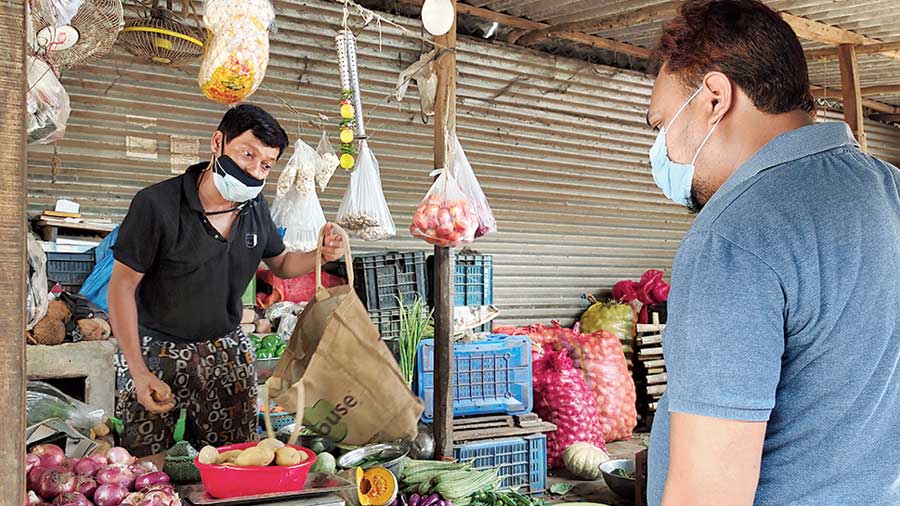A trip to the vegetable or fruit market this week may burn a hole in your pocket. Prices are skyrocketing and vendors are blaming everything from rising transportation to distress sale of damaged crops after Cyclone Yaas.
“Vendors of Salt Lake generally travel to Koley Market and Bhangar wholesale markets to get vegetables. Earlier we had to pay around Rs 350-400 for travelling up and down but now, due to increased diesel costs, we are having to pay anything between Rs 700 and Rs 1,000 for the same trip,” said Subir Bose, a GD Market vendor. “Sale prices are rising as these costs have to be covered.”
A couple of weeks ago, cauliflowers sold for Rs 50 in the township but they are now selling at Rs 75. Jhingey was selling for Rs 45 a kilo and now they cost Rs 70; the price of bitter gourd too risen from Rs 60 to 80.
In Baisakhi’s fruit section, the price of Chikus has risen so much that Pachu Gopal Dey has stopped getting them altogether. “Who will buy them at Rs 400-450 a kilo? Kharbuja (muskmellon) is now Rs 80/kg and papaya Rs 50. People are grumbling about these prices itself so more expensive fruits are simply off my cart,” said Dey.
Aajit Malik, a vendor who pushes a fruit cart around the township, says jackfruits are now Rs 60/kg, a good Rs 10 dearer than they were two weeks ago and way costlier than the price in 2020. “Wholesalers say many jackfruit trees fell during the recent cyclones and so this year overall production has been less,” he said.
Soham Chakraborty, a resident of ED Block, said his shopping expenditure had nearly doubled in the past couple of weeks. “One cannot stop eating so we are being forced to spend nearly double,” said Chakraborty.
Shyamal Pramanick, who runs a vegetable stall in CA Market, blamed middlemen. “Customers are blaming us for the hike in prices but it’s actually middlemen who are raking in huge profits,” he said. “They buy at much lower prices as there are several fields that had been flooded due to Cyclone Yaas but are still selling to them to us at a premium.”
The government trucks however have stable prices. “Even if the market rate for potatoes is Rs 26 we continue to sell at Rs 14. Our prices are subsidised. In fact, our demand jacks up whenever prices in the free market rise,” said vendor Habib Khan at Baisakhi Market. “Since it’s not season for Simla apples yet, we are depending on imported ones from New Zealand, selling at Rs 200 a kilo.”
The price of mangoes has risen too but Asadul Gaji of CK Market said it is because its season is fast ending. “It is mainly Lyangda available now, at Rs 70 a kilo. Supply is dwindling but people can never have enough of mangoes so the price is still high.” He blames rising diesel prices for the rise in prices of other fruits.
Some products are seeing fluctuating prices. “The price of brinjal has fallen from Rs 80 to 50 since a week ago, lady’s finger has fallen from Rs 60 to 40, capsicum from Rs 120 to 100. But they might rise tomorrow,” felt Kamal Halder of Baisakhi, clueless about the reason why.
Kalipada of Joy Mata Ji in BJ Market said he could quote prices of vegetables today but they would mean nothing tomorrow. “Today cabbage is Rs 25 but tomorrow it could fall by five rupees. The market for perishables is volatile now and we cannot even say for sure that prices are rising,” he said.
Jayanti Biswas, vegetable seller of CK Market, isn’t too worried. “Prices rise every monsoon as a lot of crops goes bad in the fields during heavy rains. Rates will rationalise in winter, which is the season for most vegetables. Till then, we have to bear with fluctuations. For instance, this week lady’s finger costs Rs 60-80 while it was Rs 80-100 a fortnight ago.”
Vivekananda Das of Ramakrishna Bhandar in BJ Market cites competition from online stores. “Customers are veering towards them as they provide home delivery and can be a tad cheaper. To counter them, I have started providing bulk discount now,” he says. On purchase of 5kg, he sells potatoes for Rs 16 or 17, instead of the Rs 18 going rate.










